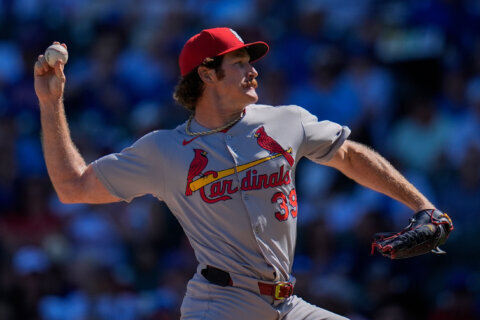Mets’ trade for Lindor may force Nats’ hand with Trea Turner originally appeared on NBC Sports Washington
The New York Mets shocked the baseball world Thursday when they acquired shortstop Francisco Lindor and starting pitcher Carlos Carrasco in a trade with the Cleveland Indians. Not only did the deal suddenly make the Mets one of the favorites to win the World Series, it gave them exclusive negotiating rights with a player in Lindor who’s capable of being a franchise pillar for the next decade.
As much as the move puts pressure on the rest of the NL East to continue padding their rosters for what’s shaping up to be a competitive division race in 2021, perhaps no team was more impacted by this trade than the Nationals. Washington already faced an uphill battle in contending for the playoffs after a 26-34 season that ended with a large chunk of its roster landing in free agency. Now, the Mets are a bigger threat and they may have just forced the Nationals to accelerate extension talks with their own star shortstop.
Trea Turner emerged as one of the Nationals’ few reliable hitters in 2020, leading the majors with 78 hits. He posted a .335/.394/.588 slash line on his way to a seventh-place finish in the NL MVP race. The numbers, albeit over a small sample size, were even more impressive than those he put up over 73 games in 2016, when he placed second in NL Rookie of the Year voting. However, a step forward was expected for the 27-year-old after he was forced to play nearly all of 2019 with a broken finger and he still put together his best full season at the plate.
The Nationals have Turner signed through the 2022 season, after which he’ll become a free agent for the first time in his career. That gives them two years to get an extension done if they want to keep him in D.C. for 2023 and beyond, but the Mets’ acquisition of Lindor could make such a deal more expensive the longer they wait.
Shortstop is the most underpaid position in baseball. The estimated highest-paid player at the position in 2021 will be Xander Bogaerts, who will receive $20 million as part of his current extension with the Boston Red Sox. Compare that to highest earners at first base ($30MM), second base ($26MM), third base ($35MM), left field ($23MM), center field ($35.45MM) and right field ($26MM). Even 34-year-old catcher Buster Posey ($21.4MM) will be making more next season than any shortstop.
For evidence of how unbalanced that is, here are the combined fWAR totals for each position over the last two seasons: catcher (77.6), first base (83.8), second base (107.9), shortstop (141.2), third base (145.8), left field (110.6), center field (120.8) and right field (132.9). Only third basemen have accumulated a higher WAR total since 2019 than shortstops.
Those cheap deals won’t last long. The shortstop market is going to explode after the 2021 season, when Lindor headlines a class of free agent shortstops that will include Javier Baez, Carlos Correa, Corey Seager and Trevor Story. The year after that, Turner, Bogaerts, Tim Anderson and Dansby Swanson will follow. That’s a lot of premium players who will in all likelihood reset the shortstop market.
Download and subscribe to the Nationals Talk podcast
Lindor landing with the Mets puts him on a team just purchased by hedge fund manager Steve Cohen, whose $14.6 billion net worth makes him the richest owner in American professional sports. Mets team president Sandy Alderson told reporters Thursday that while the team hasn’t yet approached Lindor about an extension, it’s interested in keeping him long term.
That means Lindor has a good chance of being the first of those star shortstops to sign, which would in turn raise the price for Turner. A similar situation unfolded over the 2018-19 offseason when the Nationals attempted to negotiate an extension for third baseman Anthony Rendon.
It was reported that Rendon was seeking a deal comparable to Jose Altuve’s seven-year, $163.5 million contract with the Houston Astros. That all changed when the news broke that the Colorado Rockies had signed Nolan Arenado to an eight-year, $260 million extension. Rendon’s numbers were already comparable to Arenado’s, and that was before he put together an MVP-caliber season in 2019. His price tag spiked enough that the Nationals were forced to choose starter Stephen Strasburg over Rendon, who went on to sign a seven-year, $210 million deal with the Los Angeles Angels.
Time is running out for the Nationals to make Turner the first star shortstop to sign in this new era of elite players at the position. If they wait too long, it could cost them millions — or even the player himself.






